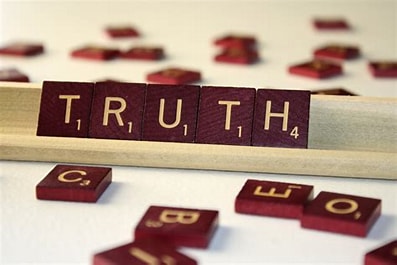Always tell the truth—it’s the easiest thing to remember.
“The Lord detests lying lips, but He delights in men who are truthful.”
Proverbs 12:22
In these uncertain times, it’s becoming difficult to know if what we hear, read, or are being told is the truth.
I’m the type of person to whom truth is of paramount importance: truth in relationships, the truth in what I read, and the truth in what I’m being told by anybody. It’s even important for me to know the truth about myself.
What is truth? I looked up several meanings:
- Truth is knowledge that reflects the way things really are.
- Truth corresponds with the facts.
- Truth is the property of being in accord with facts or reality.
- Truth is not judgmental but factual.
- Truth is knowledge proved about events, as opposed to interpretation.
We can see that truth is closely aligned with facts. What are facts? A fact is information used as evidence, a thing that is known or proven to be true. It isn’t easy to define truth without using facts or facts without using truth.
These definitions support what I have always believed the truth to be. I have also always thought that there can only be one truth and that truth cannot contradict itself. I’ve often heard the quote, “You are entitled to your own facts, but you are not entitled to your own truth.”
Many believe truth is a collective judgment, the product of cultural consensus.
How often have you heard, “That may be true for you, but it’s not true for me.” Truth is truth—the same for everyone. It’s whether or not you choose to believe the facts upon which the truth is based. And facts do not cease to exist just because they are ignored.
I’m reminded of a scene in the movie, “Fiddler on the Roof.” The main character, Tevye, is talking with his friends. One gives an opinion on something, and Tevye responds, “You know, you are right.” Then another friend provides his opinion, which contradicts the first. Tevye responds, “You know, you are right.” A third friend challenges Tevye saying, “He is right, he is right—they can’t both be right.” Tevye answers the third friend, “You know, you are also right.”
Anton Thibaut, a philosopher, said, “The wise try to adjust themselves to the truth, while fools try to adjust the truth to themselves.” That’s another way of saying, “Your truth, my truth.”
Truth has no reasonable significance apart from a fixed source.
As a follower of Jesus Christ, I believe God is that fixed source. One of the 10 Commandments states, “You shall not bear false witness against your neighbor,” which means you shall not lie. Lying is the opposite of truth. Instead, you should be truthful, as we are made in the image of God, and God is the God of all truth.
I also believe that the Bible is the Word of God and is our source of knowing the truth.
Can I prove my belief as a fact? Many say the Bible is just a historical record, not God’s Word. But more and more archeologists and scientists are finding that historical references made in the Bible prove true by what they have discovered. This lends credence to the authenticity of the Bible. But beyond these factual findings—and more will likely be found due to advanced science and technology—the Bible must be taken by faith. Before I became a believer and was skeptical, a friend once said, “Well, I can’t prove that all of it is true, but can you prove that it’s not?”
Why is knowing and telling the truth so important?
Life is best lived with a fixed point to guide our behavior. The truth is that fixed point. Without the truth, things can become confusing and chaotic, even destructive.
In a court of law, people sworn in to testify take an oath: “Do you swear to tell the truth, the whole truth, and nothing but the truth, so help you God?” That statement emphasizes that what the person is about to say must be the truth, or a just verdict cannot be reached.
There’s a reason truth is so important to me.
When I was in my early twenties, my dad was diagnosed with pancreatic cancer. But my family kept this information from me. Their reasoning was that I would get too upset and unable to handle it. They deprived me of the knowledge that my dad was dying. It was months before I learned the truth from my dad’s doctor, who was stunned that I didn’t know. I can’t even describe how devastated I was. Precious months had passed when I could have focused on my dad and cherished the time with him. He died just a few months later.
I realized that my family’s perception of me as unable to handle the truth was based on my own behavior.
I was always easily angered, and that pushed people away. While Dad was dying, no one wanted to deal with my angry behavior at that stressful time. That was the truth I learned about myself.
I vowed to change so that never again would people be so afraid of my behavior that they would keep the truth from me. Now I welcome hearing the truth, no matter what it is, even if it’s something distasteful about me.
It is said that the truth hurts, and that is true! But the truth is also healing, brings clarity, is constructive, allows for change, and sets you free.


